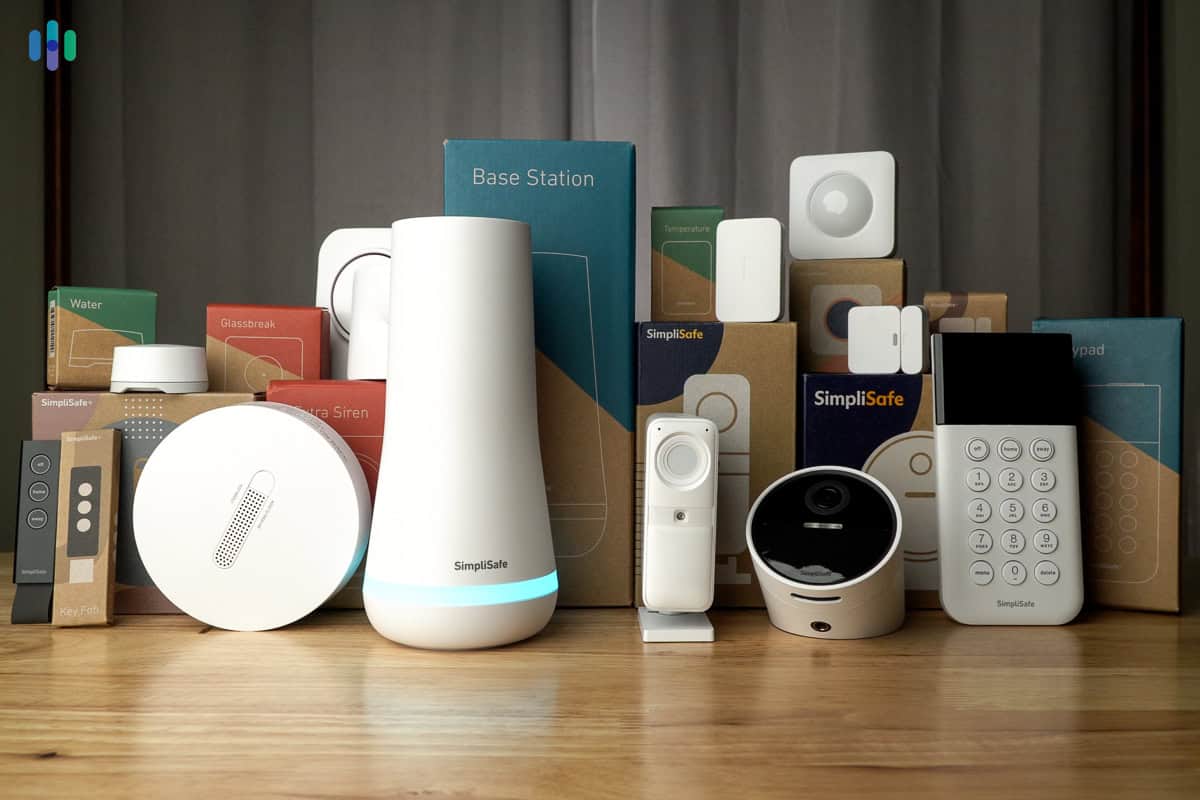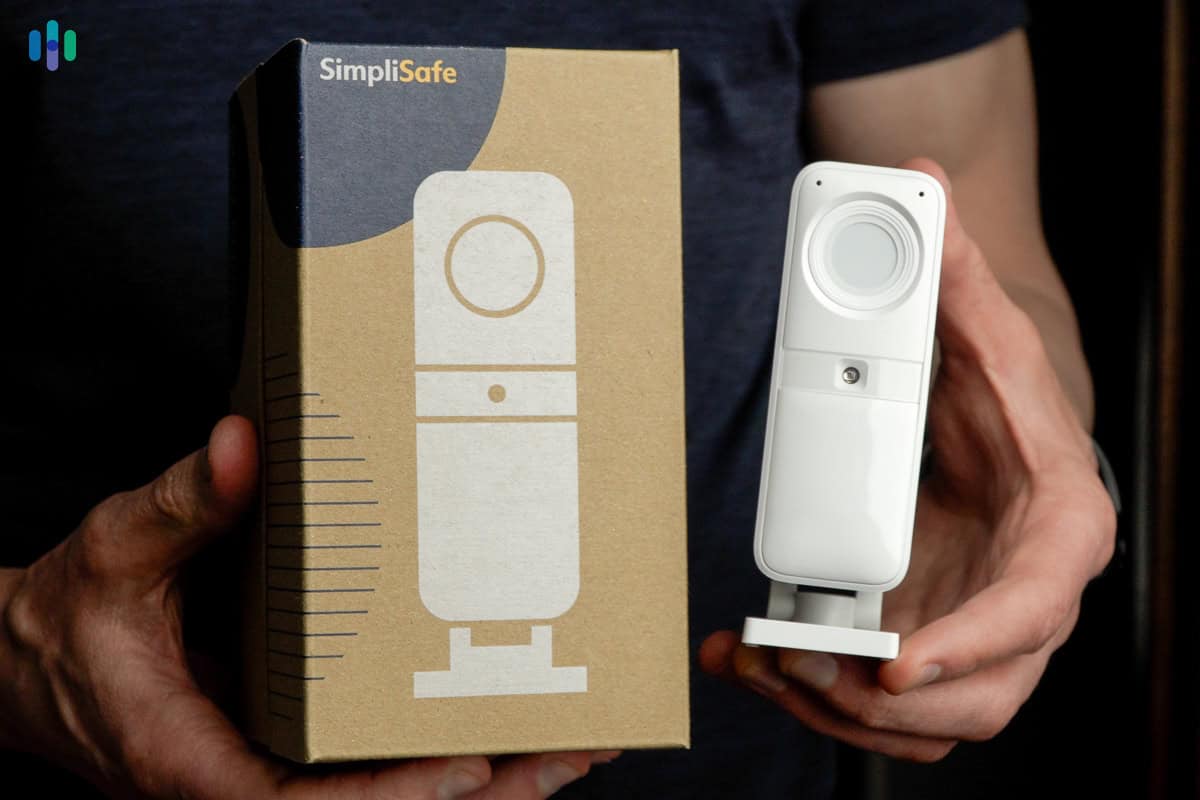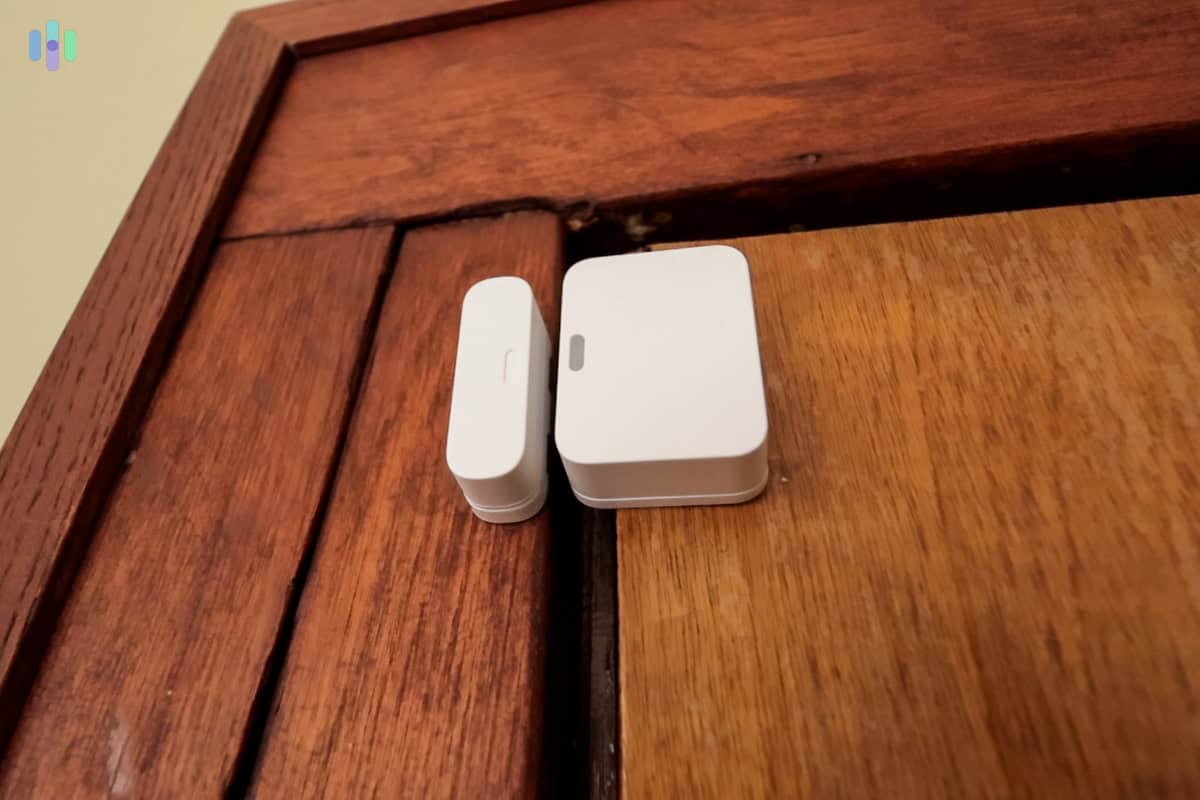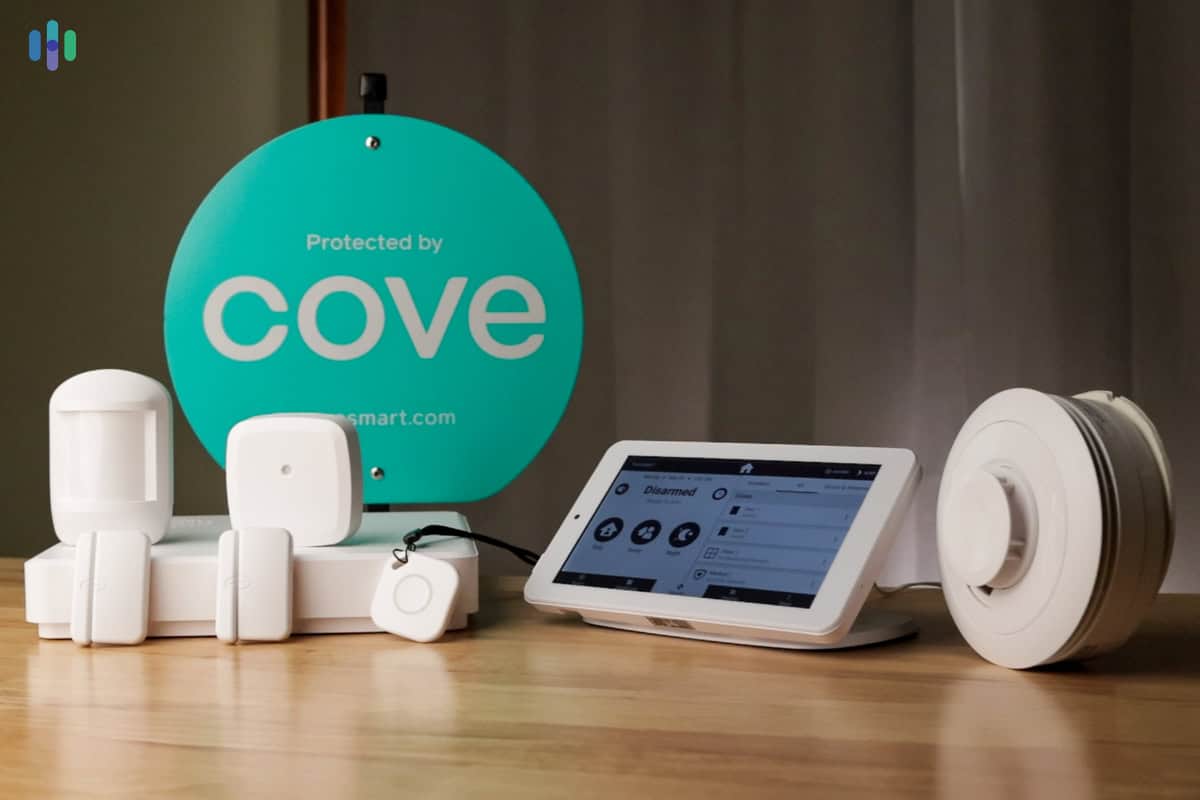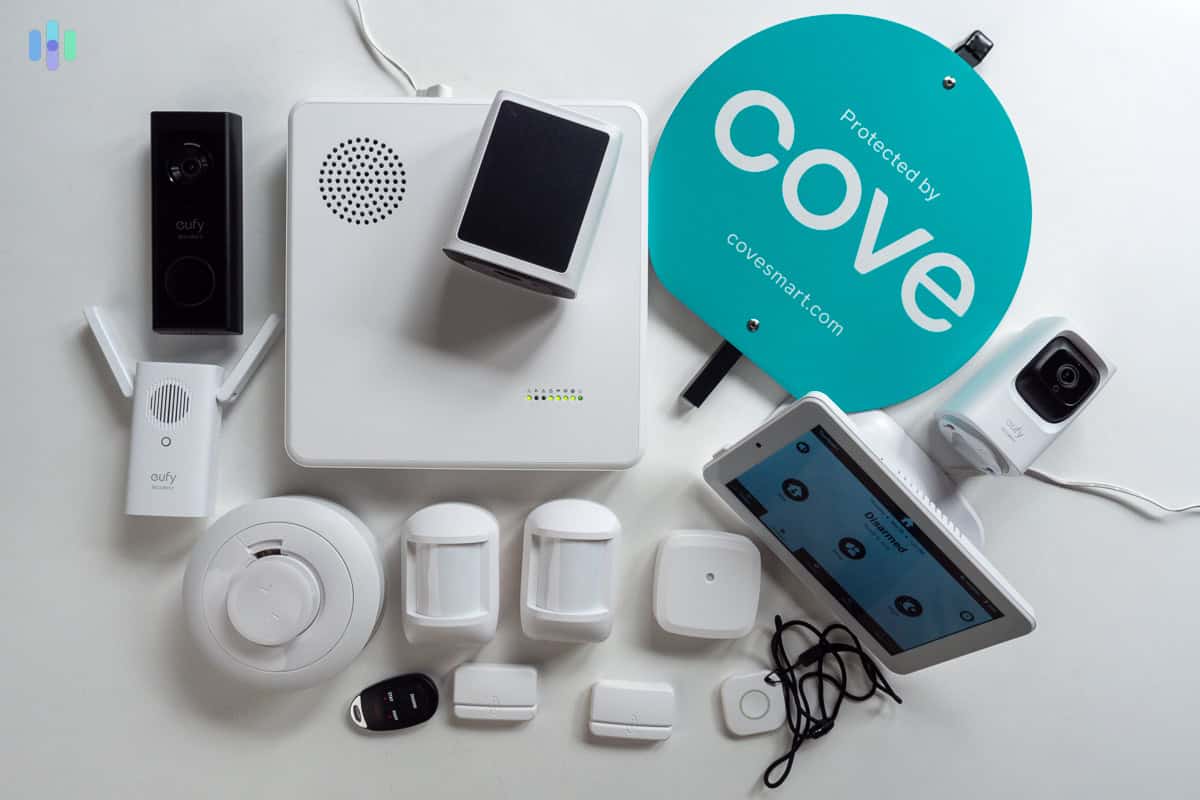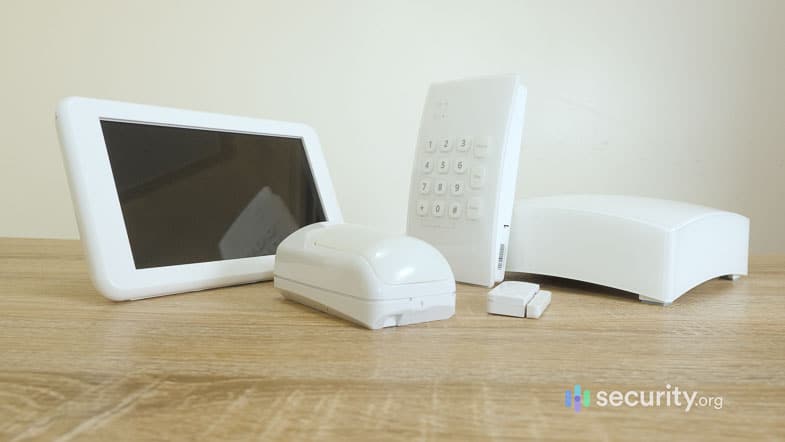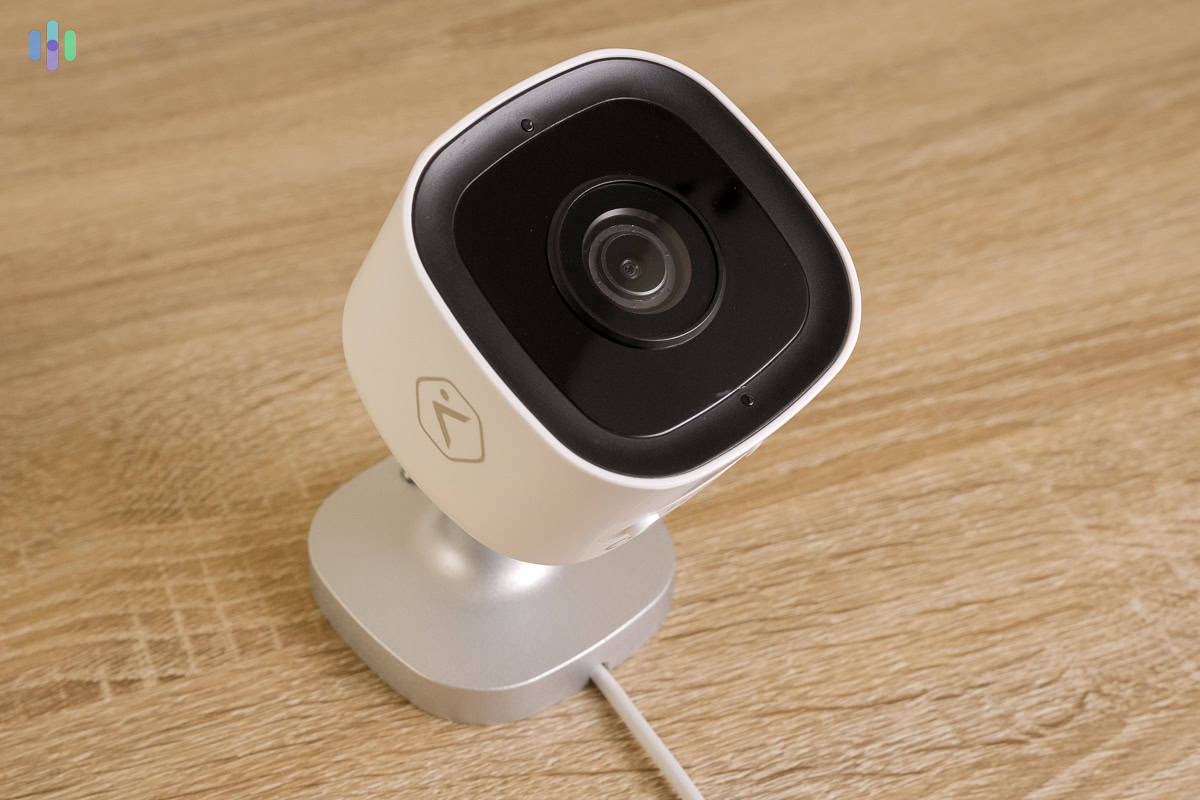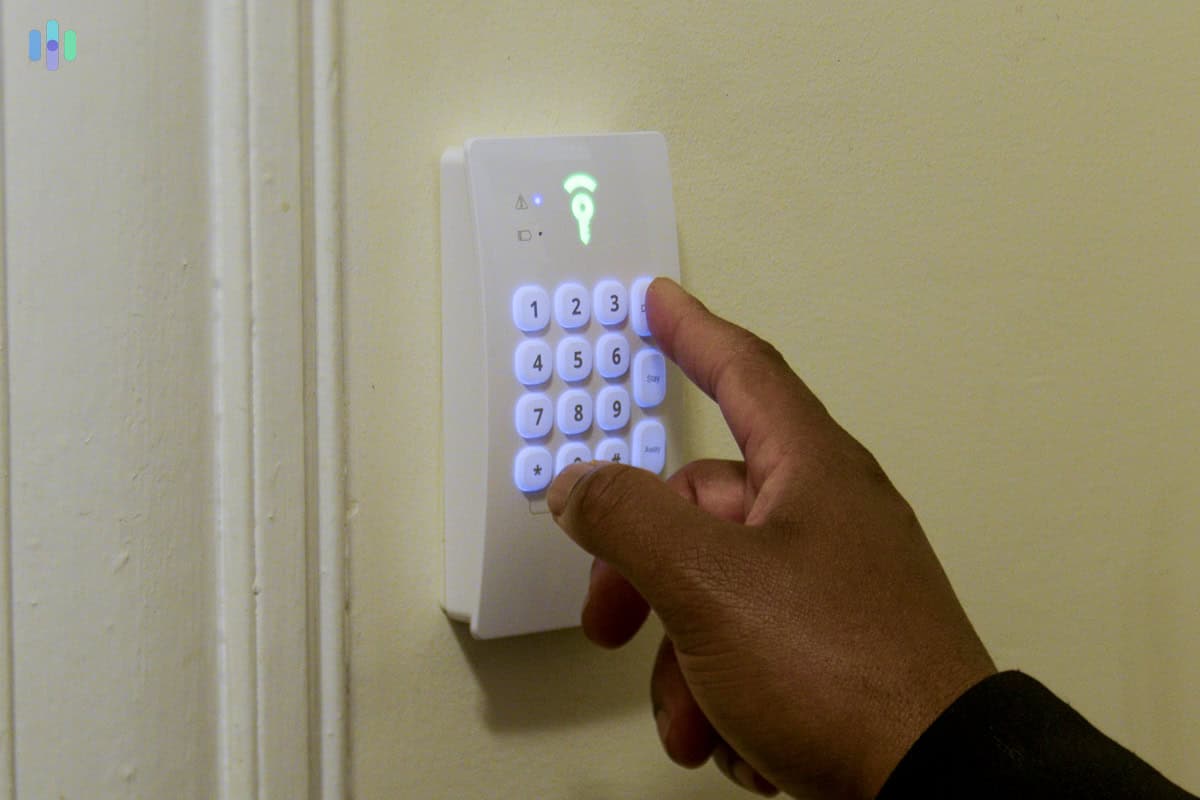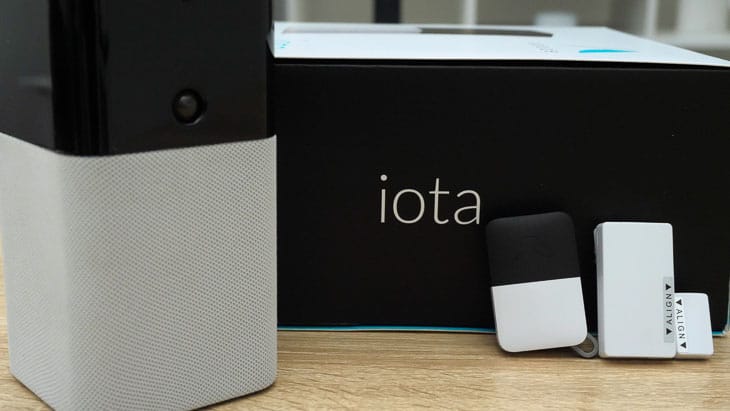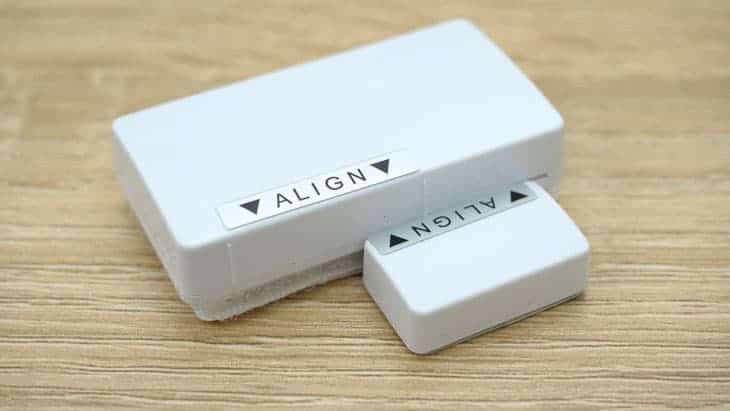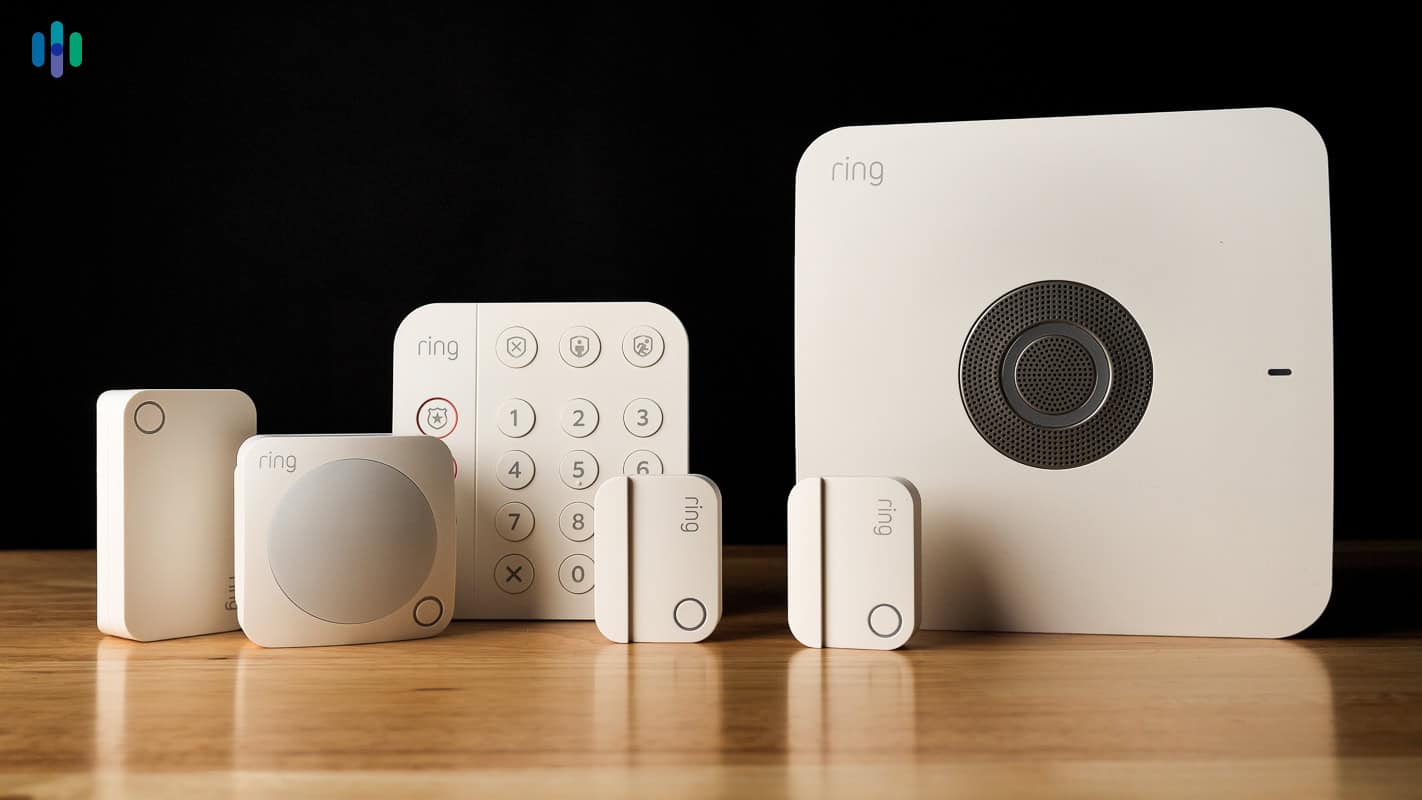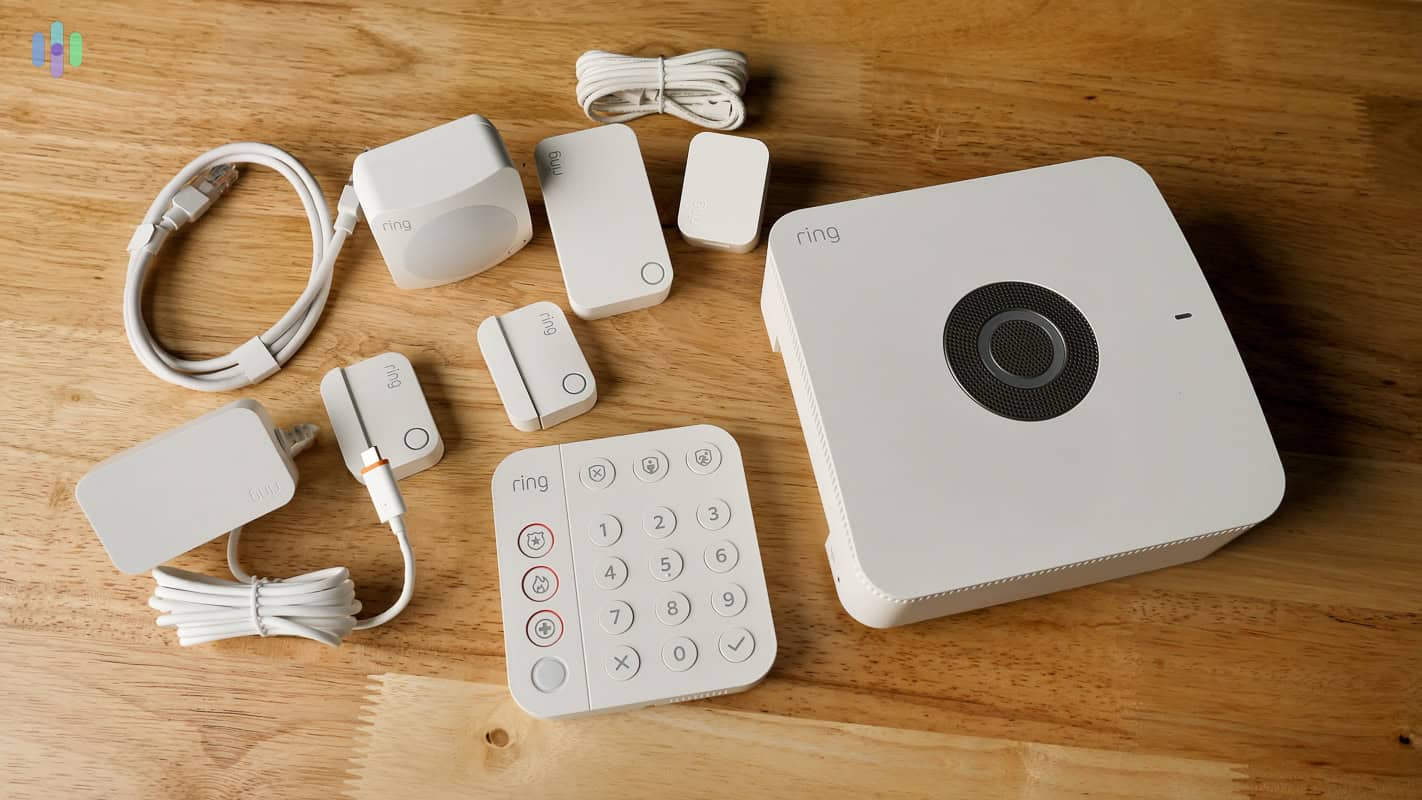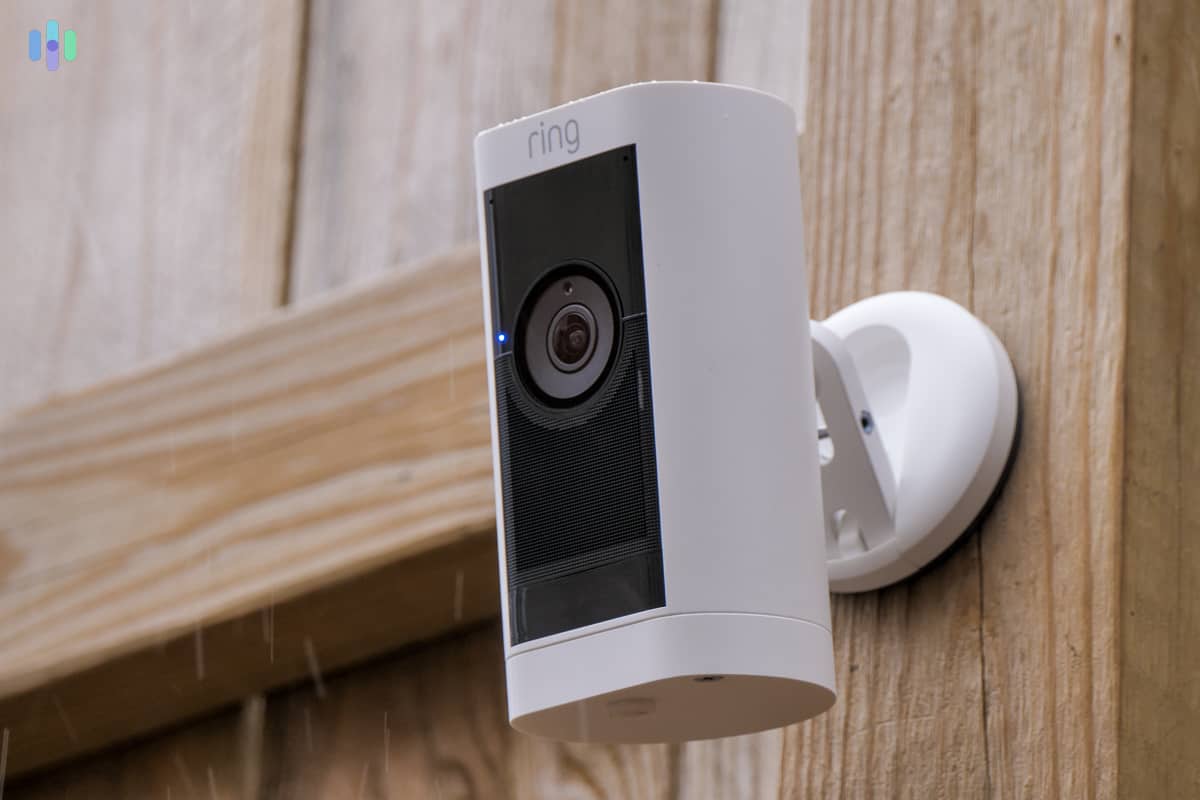Best Home Security Systems for Renters of 2024
We tested the top five security systems for renters and decided SimpliSafe is the best option because of its equipment.

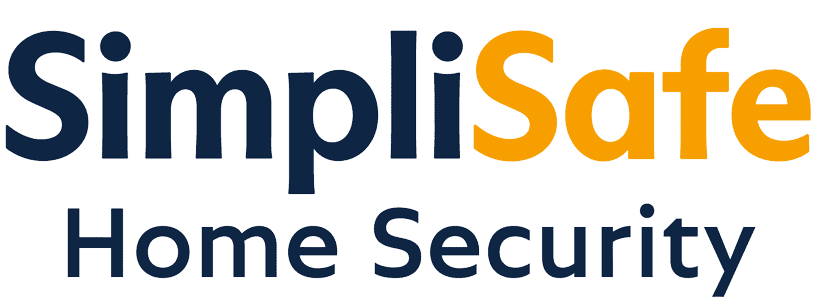
- Company founded specifically for the renters market
- Stick-up cameras and sensors don’t damage walls
- Optional silent alerts mean alarms won’t disturb your neighbors

- Easy DIY installation
- Affordable monitoring starting at $19.99 per month
- Cellular backup for all plans

- Studio and single-bedroom apartment packages start at $69.00 during sales
- No fees if you need to move to a new place
- Wireless equipment means no drilling required
Every place you call home needs a working home security system. It doesn’t matter whether you’re the owner or you’re renting, your life will simply be safer if you have a security system in place. That said, shopping for a security system for a rental might make you feel like your options are limited. And that’s partly true; contracts, professional installation that requires drilling, and strict moving policies take a few of our normal recommendations out of the equation.
That doesn’t mean you don’t have access to some of the best security systems. I just had to do some extra research to find them for you.
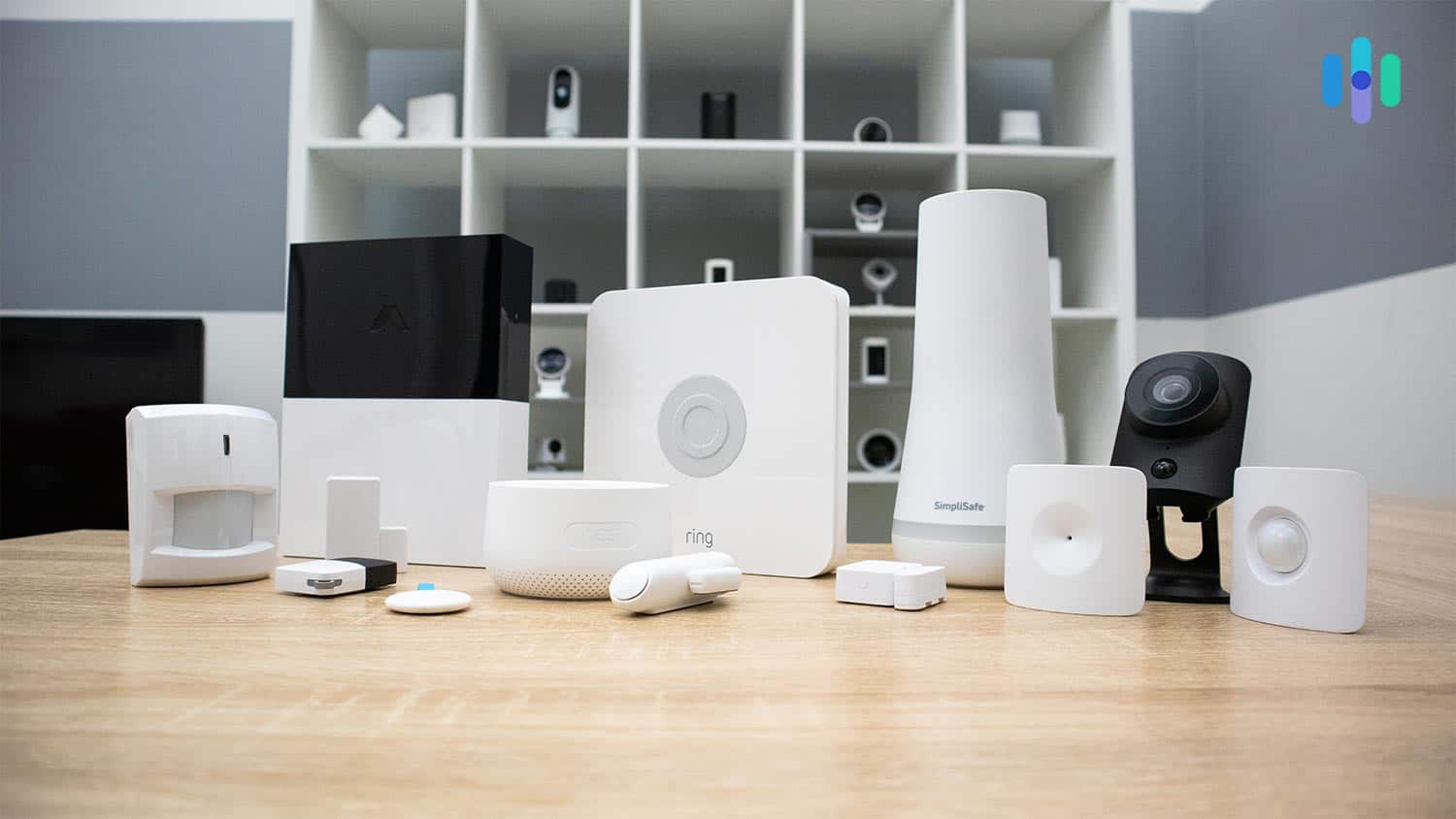
I’ve been testing and reviewing security systems for years, and I’ve used that experience to come up with this list of the best security systems for renters. This roundup will give you a great sense of which security systems can keep your family and your property safe, no matter where you call home. To jump to conclusions, we recommend SimpliSafe, Cove, Frontpoint, abode, or Ring Alarm.
Comparison of the Best Renter-Friendly Security Systems
| System |
SimpliSafe

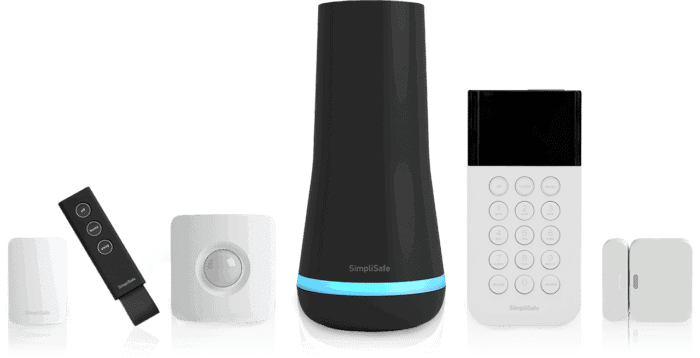
|
Cove

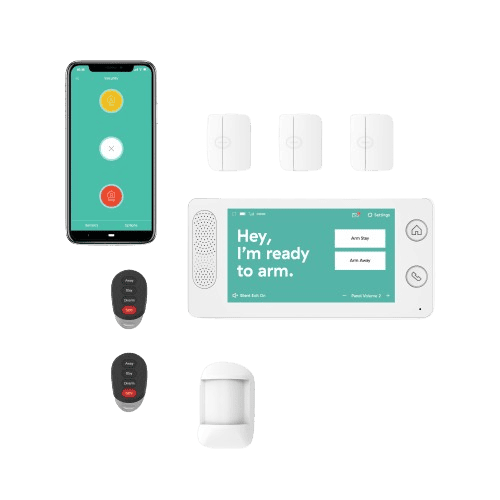
|
Frontpoint

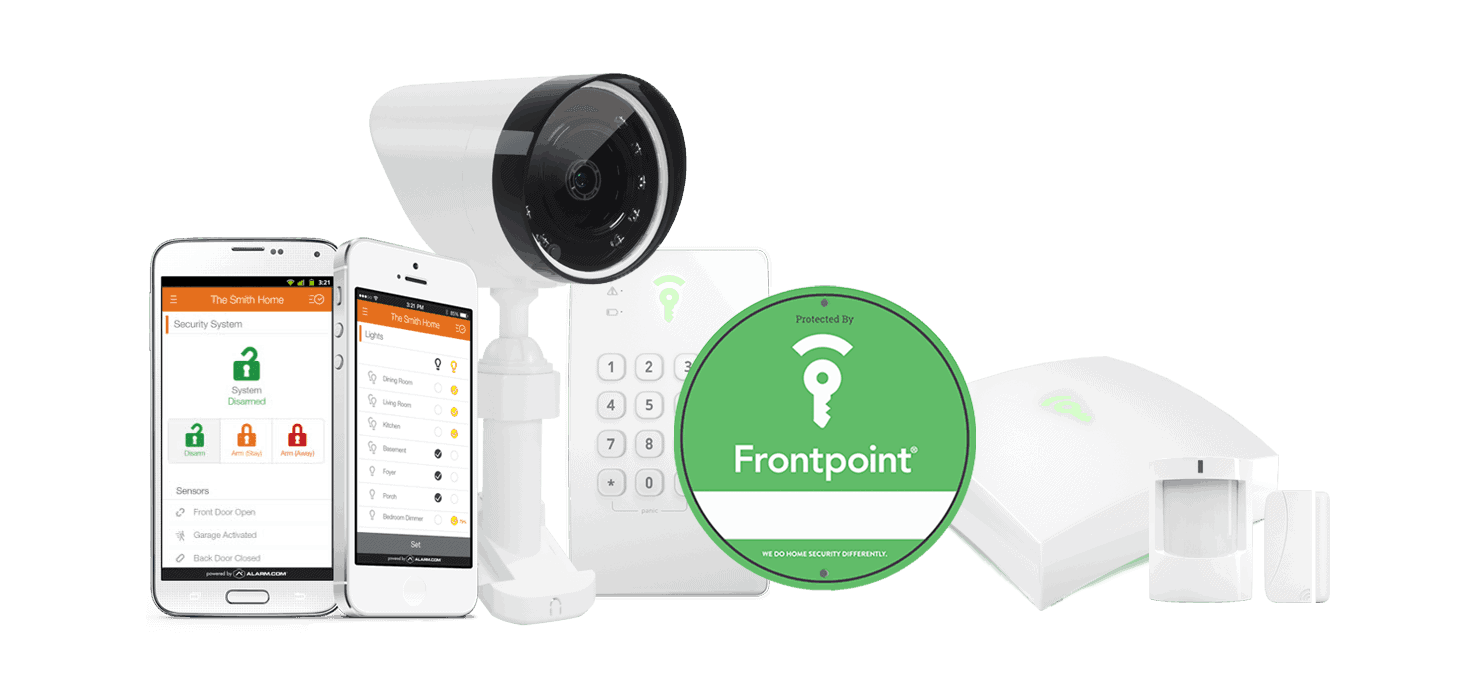
|
abode

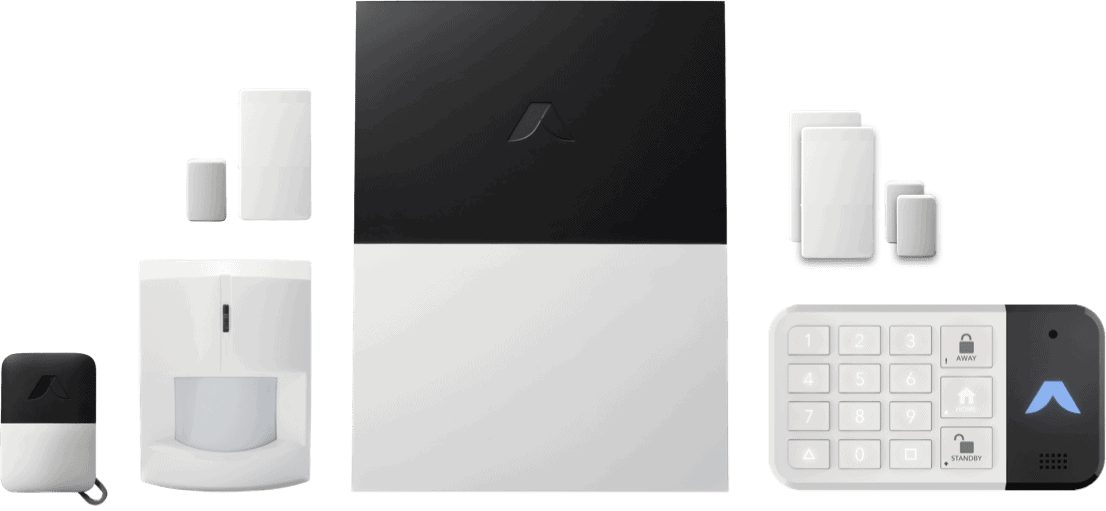
|
Ring Alarm

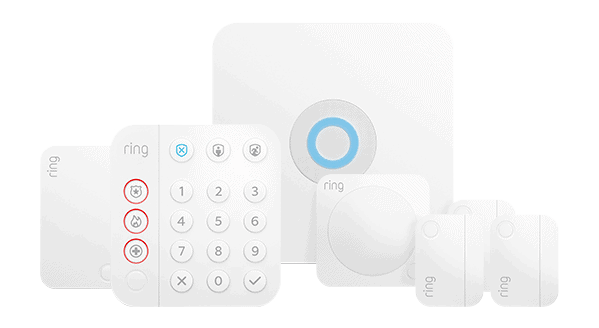
|
|---|---|---|---|---|---|
| Ranking | 1st | 2nd | 3rd | 4th | 5th |
| Ratings | 9.2/10 | 8.7/10 | 8.9/10 | 8.0/10 | 7.7/10 |
| Installation | DIY or professional | DIY only | DIY only | DIY or professional | DIY or professional |
| Best subscription price | $9.99 per month | $19.99 per month | $49.99 per month | $6.99 per month | $4.99 per month |
| Professional monitoring cost | $21.99 per month | Included | $49.99 per month | $24.99 per month | $20 per month |
| Equipment package prices | Starting at $249.96 | Starting at $330 | Starting at $386.93 | Starting at $159.99 | Starting at $199.99 |
| Read Review | SimpliSafe Review | Cove Review | Frontpoint Review | abode Review | Ring Alarm Review |
Best Home Security for Renters
- SimpliSafe - Best Security Equipment
- Cove - Most Affordable Home Security
- Frontpoint - Easiest Setup
- abode - Best for Home Automation
- Ring Alarm - Best Equipment Selection
-
1. SimpliSafe - Best Security Equipment
View Packages Links to SimpliSafeProduct Specs
Equipment Costs Packages starting at $249.96 Monitoring Options Professional and DIY Monthly Monitoring Costs Starts at $21.99 per month Contract Lengths Month-to-month Installation Options DIY or professional Smart Platform Integration Alexa and Google Home SimpliSafe Overview
We bought every available device from SimpliSafe for our comprehensive testing. Fun fact: When SimpliSafe first came out, it was advertised as a security system for renters. Even though that was nearly 20 years ago, it’s still a top option for renters. And for good reason. There is a lot to like about SimpliSafe, especially the equipment. It’s all high quality, easy to install, and noninvasive. Even with buying every component they offer, I didn’t need drills or have to punch holes in our drywall to install the entire system. I also didn’t need to touch our wiring either which is all perfect for renters. The only exception was the wired video doorbell, but other than that, SimpliSafe is plug-and-play.
>> Read More: SimpliSafe vs. Abode
SimpliSafe is also one of the best no-contract home security systems. I have more information on that below, but it means you own the equipment outright and can choose whether to pay for a monthly subscription whether that’s cloud recordings or professional monitoring. There’s also no obligation to continue a subscription and no fees if you choose to back out of a plan. That can alleviate some financial headaches if you’re ever in a pinch.
Let’s look at some pros and cons, and then we’ll talk more specifically.
What We Like
- DIY, wireless installation
- High-quality equipment
- No contract required
What We Don’t Like
- Smart home features require a plan with cloud storage
- Limited equipment choice
- No free cloud recording
SimpliSafe Monitoring
The first thing you’ll probably be interested in is SimpliSafe’s monitoring options. There are three plans to choose from, as well as a free self-monitoring option. That’s great news for renters who are pretty comfortable keeping an eye on the system themselves, but also may want the option to increase their security profile down the line. I went with the Core (formerly Fast Protect) plan for the Live Guard monitoring feature when I wanted someone else looking after my home, otherwise I kept the camera recording plan active. There’s more information in my guide to SimpliSafe subscriptions and pricing, but here’s a quick breakdown.
Features Free plan Camera recording only, ten cameras Standard plan Core (formerly Fast Protect) plan Live streaming Yes Yes Yes Yes 24/7 professional monitoring No No Yes Yes Cellular connection No No Yes Yes Notifications Yes Yes Yes Yes Secret alarms No Yes No Yes Video-verified alarms No No No Yes Unlimited cloud storage None 10 cameras None 10 cameras Smart home integrations No Yes No Yes Monthly price Free $9.99 $21.99 $31.99 All these plans are pretty standard as far as costs go. Cove is a little cheaper, but not significantly. There’s like a $2 per month difference in their plans, but SimpliSafe notably offers more features. For most renters in apartments, the Standard Plan is enough. It’s cheap and straightforward. It gives you access to cellular backup in case your internet goes out.
If you want something more advanced, the Fast Protect plan is also an option. That system relies on SimpliSafe’s new Smart Alarm Indoor Camera and allows professional monitors to check your live feed if an alarm goes off. It’s what we’d recommend if you rent a house instead of an apartment. That will help SimpliSafe communicate directly with authorities about the situation, whether there is a fire, an intruder, or a medical emergency.
The SimpliSafe Smart Alarm Wireless Indoor Camera was small enough to fit in our hands despite being filled with features. >> Also Read: Best SimpliSafe Alternatives
I’ve personally used the Smart Alarm cameras, and I was impressed not only with the design, but also with the functionality. It took a little getting used to — especially since I’m a big privacy advocate and don’t like the idea of people being able to watch what’s going on in my home — but the stainless-steel privacy shutter on the lens put my mind at ease. It loudly snaps open and shut, so you know if the camera is engaged or not, and it can be set to always be closed until an alarm is tripped causing it to automatically open.
SimpliSafe Equipment Costs
SimpliSafe isn’t the cheapest option for renters — that accolade goes to Cove — but it’s still affordable, especially when you consider the quality of the equipment. Here’s a breakdown of their security packages.
Package Number of components Regular price The Haven 14 $519.86 The Beacon 10 $709.90 The Hearth 9 $399.91 The Lighthouse 7 $469.93 The Foundation 4 $249.96 SimpliSafe also offers the option to build your own system. That’s probably the best option for renters, since it’s unlikely that you’ll need exactly what one of the bundles offers. We recommend an entry sensor for each door and first-floor window as well as a wireless outdoor camera and wireless indoor camera depending on the size of your rental. To get you started, here’s a rundown of SimpliSafe’s equipment and costs.
Component Cost Entry sensor $14.99 Motion sensor $34.99 Glass-break sensor $39.99 Outdoor camera $199.99 Smart alarm indoor camera $149.99 SimpliCam indoor camera $99.00 Video doorbell $169.00 Smoke and carbon monoxide detector $69.99 Temperature sensor $29.99 Panic button $19.99 >> Read More: SimpliCam Review
Those are the regular retail prices for the individual pieces of equipment and bundles. If you pay attention to this space, though, you’ll know that a lot of providers, SimpliSafe included, tend to run frequent sales, so you’ll never have to pay the regular prices. Every time I’ve checked their site, which is almost weekly, they’re giving at least 20 percent off. If you want to stay up to date on these savings, I recommend bookmarking our guide to SimpliSafe’s deals.
Pro Tip: It’s never worth waiting around for a sale leaving your home vulnerable in the meantime. So, I recommend getting a basic system to protect your home now if there aren’t any good deals and then buying more components during their next big sale. That way you don’t need to wait to protect your home, but you can still take advantage of SimpliSafe’s deals.
Why I Picked SimpliSafe for Renters
We installed a SimpliSafe Entry Sensor on our front door using the peel-and-stick backing. Simply put, SimpliSafe offers a great balance of everything I’d be looking for if I were going to outfit an apartment or rented home with a security system. It has high-quality, affordable equipment that I easily installed myself; affordable subscription and monitoring options that don’t require contracts; and a reputation for excellence in the industry. I’d like to see a few more equipment options, but, all things considered, it’s hard to find a more well-rounded system.
Worth Considering
One thing I didn’t particularly like about SimpliSafe is that, regardless of the system, the company requires you to purchase and install a push-button keypad that costs $70. Something about that doesn’t sit right with me. You’d think such a modern system could do away with that outdated piece of equipment, especially since you’ll be managing everything from your smartphone most of the time.
-
2. Cove - Most Affordable Home Security
View Packages Links to CoveProduct Specs
Equipment Costs Systems start at $330 Monitoring Options Professional Monthly Monitoring Costs Starting at $19.99 per month Contract Lengths No contract required Installation Options DIY Smart Platform Integration Alexa and Google Home 
Cove Overview
We bought enough sensors with our Cove system to cover our entire first floor. One thing I like about Cove is that it makes home security accessible to everyone. Its low cost of entry coupled with affordable monthly monitoring means your money goes a long way, and its high-quality equipment is reasonable. During my research, I put together a sample home security system for an average ground-floor apartment and found that costs were usually below $300 since they’re always running a sale.
Just because Cove is one of the best affordable home security systems doesn’t mean it’s cheap. These systems are built to last and offer some of the high-quality protection I only expect from systems at twice the price.
What We Like
- Easy DIY installation
- Affordable monitoring starting at $19.99 per month
- Cellular backup for all plans
What We Don’t Like
- Could have more extensive equipment list
- No self-monitoring option
- Only Cove Plus plan members have access to smartphone apps
Cove Monitoring
Although it’s affordable, Cove unfortunately doesn’t offer a self-monitoring option. That’s a turnoff for me since I like flexibility with my monthly subscription, but if you know you want monitoring, Cove’s price points are better than most. There’s more on this in my guide to Cove’s prices, but here’s the quick breakdown.
Feature Cove Basic Cove Plus 24/7 professional monitoring Yes Yes Cove InstaText Yes Yes Cove LiveAssist Yes Yes Smash-and-grab protection Yes Yes Cellular backup Yes Yes Equipment warranty 1 year Lifetime Smartphone control No Yes Alexa and Google Assistant Integrations No Yes Lifetime rate-lock Guarantee No Yes Monthly cost $19.99 $29.99 FYI: The lifetime rate-lock guarantee might not seem like a big deal when you’re first buying a Cove system, but it can come in handy. While I was testing Cove, they raised their monthly rates by $2 per month for both plans. Since I went with the Cove Plus plan, my rates stayed the same.
Both of Cove’s plans will work great for renters, and they’re both priced about where they should be. If you really want a self-monitored system, though, you can always check out my guide to the best unmonitored home security. Keep in mind, though, that it puts a lot of responsibility on you. If an alarm sounds, you’ll be on your own.
Cove Equipment Costs
To put Cove to the test, we installed a complete system with every available component. There’s no two ways about it: Cove is the most affordable home security provider in the industry. It doesn’t have an extensive list of equipment, but the components it does have are all durable and designed with human use in mind. Nothing is too obtrusive, either. That’s useful for smaller apartments without enough space to hide security equipment. When I tested the system, my partner was out of town on a business trip. When she came home, it took her a full day to notice that we had a whole new security system installed. How’s that for discreet?
Design aside, here’s the breakdown of Cove’s prices.
Item Price Cove Touch alarm panel $150.00 Door sensor $15.00 Motion detector $50.00 Glass-break sensor $50.00 Window sensor $15.00 Smoke and carbon monoxide detector $95.00 Medical/panic button $30.00 Outdoor camera $129.99 Indoor camera $59.99 Doorbell camera $99.99 Did You Know: That’s Cove’s retail pricing. Since I’ve been covering Cove, they’ve always been running a sale that at least cuts the cost of most equipment in half.
Why I Picked Cove for Renters
Three words: affordability, affordability, and affordability. If you’re looking to build a basic system with Cove, you can keep your costs really low. That’s great news, especially since rent prices are always going up. Their entry sensors regularly go on sale for under $5 a piece which means a system for my old apartment would cost under $100 for the Hub, Control Panel, and two entry sensors. I would like to see an option for self-monitoring, but Cove is near the top of the bang-for-your-buck list.
Worth Considering
You don’t have a lot of options when it comes to equipment. You can count the list using your fingers (and one toe.) If that list covers your needs completely, that’s great, but I can see it being a little lacking for anyone renting a bigger home.
Similar to Frontpoint, I wish Cove would offer a self-monitoring option. For a brand that bills itself as affordable, it’s weird that it requires a monthly fee with every system.
-
3. Frontpoint - Easiest Setup
View Packages Links to FrontpointProduct Specs
Equipment Costs Starting at $386.93 Monitoring Options Professional only Monthly Monitoring Costs Starting at $49.99 Contract Lengths 1-36 months Installation Options DIY Smart Platform Integration Alexa and Google Home Frontpoint Overview
Frontpoint’s customizable systems ensured we could protect an apartment without buying components we didn’t need. Frontpoint is another great option for renters who are looking for the ease of a DIY system with the power of a professionally monitored one. You’re getting the best of both worlds here.
>> Check Out: DIY vs. Professional Installation
The last time I tested Frontpoint, it took me about an hour to get everything up and running, from unboxing to a fully secured home. I was testing quite a few pieces of equipment, too, including the outdoor camera, flood sensor, and wireless light control. If you’re looking for a more basic system, you could probably cut that install time in half.
I was impressed by the quality of the system. Everything is really well designed, everything feels durable and substantial, and — probably most importantly — everything works as intended. I was most impressed by the Frontpoint touch screen. I’ve worked with a few other touch screens that were pretty sluggish and had a lot of lag time between tapping something and the system reading the input. Not so with Frontpoint’s touch-screen panel; everything is really snappy. And there’s no doubt that I preferred Frontpoint’s touch screen to SimpliSafe’s analog keypad.
Did You Know: It took me less time to set up a Ring Alarm security system than Frontpoint. But, the Frontpoint install felt more solid since it relied less on peel-and-stick backings. Check out our Frontpoint vs Ring comparison to get the details on each system’s install process.
Let’s talk pros and cons, and then we’ll get into the details.
What We Like
- Great customer support
- Easy DIY installation
- Smart home options
What We Don’t Like
- High monthly fees
- No self-monitoring option
- No subscription plans
Frontpoint Monitoring
Although some pieces of equipment require plugging in, we didn’t need to hardwire any of them which is perfect for rentals. Here’s where Frontpoint starts to lose some ground with me. There is no option to self-monitor the system, and there is only one subscription plan, which costs $49.99 per month. You don’t have to sign a contract, which is good, but $50 per month is a little steep. Here’s a breakdown of what you get.
Ultimate Monitoring Plan
24/7 professional monitoring Yes 100% wireless and cellular Yes Unique user codes Yes Crash-and-smash protection Yes Mobile alert and notifications via email and text Yes Remote access and control Yes Live video streaming Yes Video and image history Yes Smart home integration Yes Price $49.99 per month That’s a pretty advanced monitoring system. I especially like the crash-and-smash protection. How that works is if an intruder comes through your door and then immediately breaks or disables your alarm panel, the Frontpoint system automatically responds as if it were an alarm event, and dispatches authorities.
I tested the crash-and-smash feature by coming through my door and immediately yanking the batteries out of the panel, which, sure enough, sounded my alarm. Definitely thinking ahead, Frontpoint.
Pro Tip: Frontpoint now says you can pay as little as $15 per month for plans to keep your system operational. You’ll need to call them up and negotiate a plan with them which I don’t like. And don’t expect all the bells and whistles like video history or smart home capabilities.
Frontpoint Equipment Costs
Less than a year ago, Frontpoint simplified their equipment packages down to two choices and a build-your-own option. They used to have a bunch of packages like SimpliSafe. Here are their current offerings:
Name Equipment Regular price Sale price Essential Home Security - Hub
- Keypad
- Yard sign and stickers
- Two door sensors
$386.93 $59.00 Total Home Security - Hub
- Keypad
- Yard sign and stickers
- Three door sensors
- Indoor camera
- Motion sensor
- Outdoor camera
- Smoke and heat detector
- Touchscreen
$1,061.87 $309.00 Something to note: Similar to SimpliSafe, Frontpoint tends to overinflate the “regular” price and then offer a deep discount that puts its packages in a reasonable range. As you can see, each package is well over half off just like every time I check their prices. I’m not exactly sure why the company does that — I’m sure it’s a marketing thing — but if you’re interested in a Frontpoint system, you’ll probably be able to build one capable of fully protecting an apartment for about $300. You can read more about that in my guide to Frontpoint’s pricing.
We installed our Frontpoint Keypad in our foyer so we could easily arm our system as we walked out the door. Here are all the Frontpoint components you’ll be able to select, as well as their current prices.
Component Price Door or window sensor $34.99 Wireless Doorbell camera $299.98 Garage door tilt sensor $44.99 Glass break sensor $74.99 Indoor camera $119.99 Motion sensor $69.99 Outdoor camera $229.99 Smart door lock $199.99 Touch screen $149.99 A lot of these components cost a little less than their SimpliSafe counterparts when counting the sales I always see from Frontpoint. They change their percentage discounts frequently, so we listed their retail pricing, but you can expect them to be roughly half off. You can always keep a close eye on things with my guide to Frontpoint’s deals.
Why I Picked Frontpoint for Renters
Frontpoint’s powerful professional monitoring, coupled with its super-simple DIY install, make it a great option for renters. The price is a little steep, but the added peace of mind you’ll get from a professionally monitored system is invaluable.
I also really liked Frontpoint’s customer-support system. I had a bit of an issue with my sensors connecting to my base station, so I gave them a ring. The person who answered was super friendly and helpful, and was able to walk me through a few options to get everything working again.
Worth Considering
I have to point out again that Frontpoint doesn’t offer a self-monitoring option, which is a particularly hard pill to swallow when you consider its mandatory $49.99-per-month monitoring fee. They offer plans as low as $14.99 per month, but that requires calling Frontpoint and asking them for a lower priced plan. I don’t like getting on the phone and negotiating pricing, so I just bought the full monitoring plan which is what I imagine most customers do too.
I’m also not a huge fan of the sales technique in which the company marks up its prices tremendously and then says you have to take advantage of a sale that never actually ends. It seems a little shady to me, but now you’re in the know.
>> Read More: Best Professionally Monitored Home Security Systems
-
4. abode - Best for Home Automation
View Packages Links to abodeProduct Specs
Equipment Costs Packages starting at $160 Monitoring Options Professional and DIY Monitoring Costs Starting at $69 per year ($5.83 per month) Contract Lengths Yearly Installation Options DIY or professional Smart Platform Integration Alexa, Google Home, and Apple HomeKit Abode Overview
We installed the abode Iota system in our home so we could fully access its smart home integrations. Just because you rent your home doesn’t mean you shouldn’t live out your George Jetson fantasies. With easy home-assistant integration and a large selection of smart home components, abode is a great option for high-tech renters.
>> Read More: Best Security Systems for Google Home
I really enjoyed arming and disarming the system using my Amazon Alexa during the testing period, and I appreciated that I could check the status of individual components using voice commands. It was really helpful during winter mornings, when I could shout from my bed, “Alexa, pull up the doorbell feed,” so I wouldn’t have to make the frigid walk to the front door when it was just a FedEx delivery. It also let us integrate all of our smart home devices from our Philips Hue lights to the automated watering device for our plants we ordered off Amazon. That makes it a great choice if you want to set up home automation in your rental.
What We Like
- Strong home-automation offering
- Security camera built into the Iota hub
- Lots of equipment options
What We Don’t Like
- Confusing kits and bundles
- $7-per-month fee for self-monitoring with video storage
- The latest equipment costs more than other options on this list
Abode Monitoring
We’re getting back to what I like to see. Unlike Frontpoint, Abode offers three tiers of service with the option to self-monitor your system. That’s a bare-bones plan, though, and you won’t even have access to your timeline of video events. Here’s a quick breakdown, and then I’ll give you some recommendations.
Basic Standard Pro Push notifications Yes Yes Yes Customizable notifications No Yes Yes Days of cloud storage 0 7 30 Timeline access No Yes Yes Home automation options No Yes Yes Cellular backup No No Yes 24/7 professional monitoring No No Yes Monthly price $0 $6.99 $24.99 I have more general information in my guide to abode costs, but the long and short of it is this: If you’re a renter, you may want to start with at least the Standard plan. It’s only $7 per month, and you’ll get the full capabilities of your equipment. If you want to step things up with professional monitoring, though, you can always upgrade to Pro. It’s only $25 per month — way less than Frontpoint and more affordable than most other competitors as well. That’s what we recommend.
Pro Tip: abode offers a big discount for the first year of monitoring. So, we recommend starting with that when you buy your system to see if it works well for you. After that first year, the price goes up by $60 per year. At that point, reevalute and see if the Standard plan would be enough for you.
Abode Equipment Cost
I wish Abode made it a little easier to purchase its equipment online — the company’s website is a bit confusing — but, alas, here we are. There are three types of security system offered by Abode: those with the standard Hub, those with the Smart Security Hub, and those with the smart home Iota Hub. I went with the Iota Hub and it left me impressed. Here are its key features:
- A motion-sensitive IP camera with a 127-degree field of view
- Closing shutter for privacy mode
- Two-way audio with VOIP
- An 88-decibel siren
- Temperature and light sensor
- Apps for Amazon Alexa and Google Home
- Rechargeable backup battery
Since it includes an onboard camera, a light sensor, and a siren, you can save a lot of space. That’s great news if you’re an apartment dweller. When I lived in the heart of New York City, my place was something like 500 square feet, so I needed all the space I could get.
abode’s Entryway Sensors have convenient stickers that made it easier for me to install them correctly. Here are the packages offered by Abode. As always, you can build out your own system if these packages don’t suit your needs or add any component you want to any package.
Security package Number of pieces Price Current sale price Abode Security Kit 3 $159.99 $29.99 Smart Security Kit 4 $279.99 $129.99 Iota All-in-One Security Kit 3 $379.99 $249.99 It’s relatively affordable for renters, especially since Abode also keeps regular prices high and always offers sales. Keep that in mind when you’re looking at the list of component costs. These are the retail prices, so expect to pay significantly less like I did.
Component Cost Abode Cam 2 $59.99 Acoustic glass-break sensor $49.99 Key fob $19.99 Keypad 2.0 $89.99 Mini door or window sensor $29.99 Motion sensor $39.99 Panic button $21.99 Siren (indoor) $59.99 Slim strip sensor $39.99 Why I Picked Abode for Renters
If you live in an apartment but want some of the comforts that come from home automation, abode is likely the right system for you. Vivint is one of the best systems out there for home automation, and I’d consider Abode to be its little cousin. Perfect for renters!
Setting up home automation can be an exercise in trial and error though. Things won’t always work exactly how they should, and, depending on how many components you’re using, dimming your lights might make your TV turn on. It usually takes me three attempts to get home automation to work right.
Worth Considering
I wish Abode would invest in redesigning its website. I wouldn’t say it’s impossible to navigate, but it doesn’t make things easy. What’s more, it’s almost impossible to find a number to call if you’re confused. Not the best way to approach things, in my opinion.
Like Frontpoint, the company should probably knock off the whole “sale ends in eight hours” timer at the top of its site. I’ve been researching, testing, and covering Abode for years, and that sale never actually ends.
-
5. Ring Alarm - Best Equipment Selection
View on Amazon Links to Ring AlarmProduct Specs
Equipment Costs Starting at $179 Monitoring Options Professional and DIY Monthly Monitoring Costs Starting at $4.99 Contract Lengths 1-12 months Installation Options DIY or professional Smart Platform Integration Alexa and Google Home Ring Overview
I liked the aesthetic of the Ring Alarm Pro Security System. It fits our modern home. Like SimpliSafe, Ring is probably a name you’re familiar with if you’re interested in home security.
Ring’s video doorbells are probably its biggest claims to fame. In the years since the first home on your block put one up, however, it has expanded to offer a massive lineup of security equipment, from indoor and outdoor cameras to advanced entryway sensors to car dash cams.
Before I started testing security equipment professionally, I was looking for a small outdoor camera with integrated lighting that wouldn’t blind me as I was coming up my walkway at night. I simply couldn’t find what I was looking for until I started looking at Ring’s offerings. Check out my review of the Ring Spotlight Cam for more information on the piece of equipment I ended up using.
What We Like
- Huge list of equipment options
- Affordable professional monitoring
- Inexpensive equipment
What We Don’t Like
- History of privacy issues
- Design could be better
- No local video storage
Ring Monitoring
I have more detailed information in my breakdown of Ring’s costs, but the Cliff’s Notes version is that it offers three plans with a free self monitoring option. Here’s the cheat sheet.
What you get Free Ring Protect Basic Ring Protect Plus Ring Protect Pro 24/7 professional monitoring No No No Yes Cellular backup No No No Yes What it covers All Ring devices at one address 1 video doorbell/ security camera All Ring devices at one address (except Ring Alarm/Alarm Pro) All Ring devices at one address Length of cloud storage (in days) 0 60 60 60 Person alerts No Yes Yes Yes Rich notifications No Yes Yes Yes In-app SOS button No No No Yes 24/7 backup internet No No No Yes Monthly price $0 $5 $10 $20 If you’re a renter with a system that goes beyond one camera, I recommend either the Protect Plus or Protect Pro subscription. Like the other providers on this list, the subscription plan will help you get the most out of your equipment. If you want professional monitoring, you’ll have to go with Pro. That’s the only plan that offers it. It’s not too costly at just $20 per month, and you can always scale things back since Ring doesn’t make you sign a contract.
Ring Equipment Costs
Here’s everything that came with my Ring Alarm Pro security system. Ring offers a handful of security kits, which I’ve detailed below. I’d focus more on the sale price than the regular price. It doesn’t offer discounts as frequently as Frontpoint or Cove, but it’s rare not to see them on some sort of sale.
Package Pieces Regular price Sale price Protected Enhanced Security 8 pieces + Battery Doorbell Plus $454.91 $379.99 Protected Deluxe Kit 14 pieces + Video Doorbell Pro 2 $694.85 $499.99 Whole Home Basic Kit 5 pieces + Video Doorbell, Stick Up Cam $399.97 $369.99 Whole Home Enhanced Kit 8 pieces + Battery Doorbell Plus, Spotlight Cam Plus $624.90 $529.99 My favorite Ring deals happen on Prime Day since it’s owned by Amazon, but they offer other deals year-round.
Just like the other providers on this list, Ring offers an extensive list of components you can choose from to build out your own system. That’s usually the best option if you live in an apartment or other smaller residence.
Component Price Contact sensor $19.99 Panic button $29.99 Outdoor contact sensor $49.99 Glass-break sensor $39.99 Motion detector $29.99 Stick Up Cam (battery) $99.99 Spotlight Cam (battery) $169.99 Battery Doorbell $99.99 Battery Doorbell Pro $229.99 Keep in mind that this isn’t a complete list. It’s just a sampling of Ring’s full offerings.
Mounting my Ring Stick Up Cam Pro was easy on our front yard fence. Why I Picked Ring for Renters
Ring’s options make it a great choice for renters, since there are tons of components to choose from. It takes a different approach than, say, SimpliSafe. No two rental homes are the same — whether it’s a house, an apartment, a townhome, a condo, or a yurt in your friend’s backyard — and that means each home will have different security needs.
Worth Considering
I don’t know how to couch this, so I’ll just come out and say it: I don’t love the design choices on a lot of Ring’s products. They’re boxy, bulky, and not what you’d consider elegant or sleek — you know, what most of us are going for when we’re purchasing electronic equipment to install in our homes. The Ring Alarm isn’t so bad though. I’m mostly taking issue with the company’s doorbell and camera designs. They could use some work in the aesthetics department.
Why Do Renters Need Home Security Systems?
Whether you own or rent, you could be a target for burglars and thieves. That includes at rental homes, condos, townhomes, and AUDs. Sometimes renters have even bigger targets on their backs than traditional homeowners.
Apartment buildings are prime targets for thieves because it’s a lot easier to come and go unnoticed. If you live on the ground floor, you should take your physical security seriously. Burglaries occur about every 30 seconds in the U.S.,1 and they can happen at any time — day or night.
>> Learn More: The Best Security Systems for Apartments
One of the best ways to protect yourself is to install a home security system. I recommend one with some sort of external camera — a video doorbell is a great option — as well as at least one indoor motion sensor and contact sensors on every entryway that can be accessed from the outside, including windows.
Can I Install a Home Security System in My Rental?
Most of the time, the answer is yes. Obviously you should check with your landlord or management company to make sure you’re not doing anything that could invalidate your lease. You’ll probably be fine, though, as long as you’re not doing anything that involves major structural changes (installing hardwired control panels, for instance) or putting up equipment that would infringe on the privacy of your neighbors (such as an outdoor security camera pointed at a shared courtyard space).
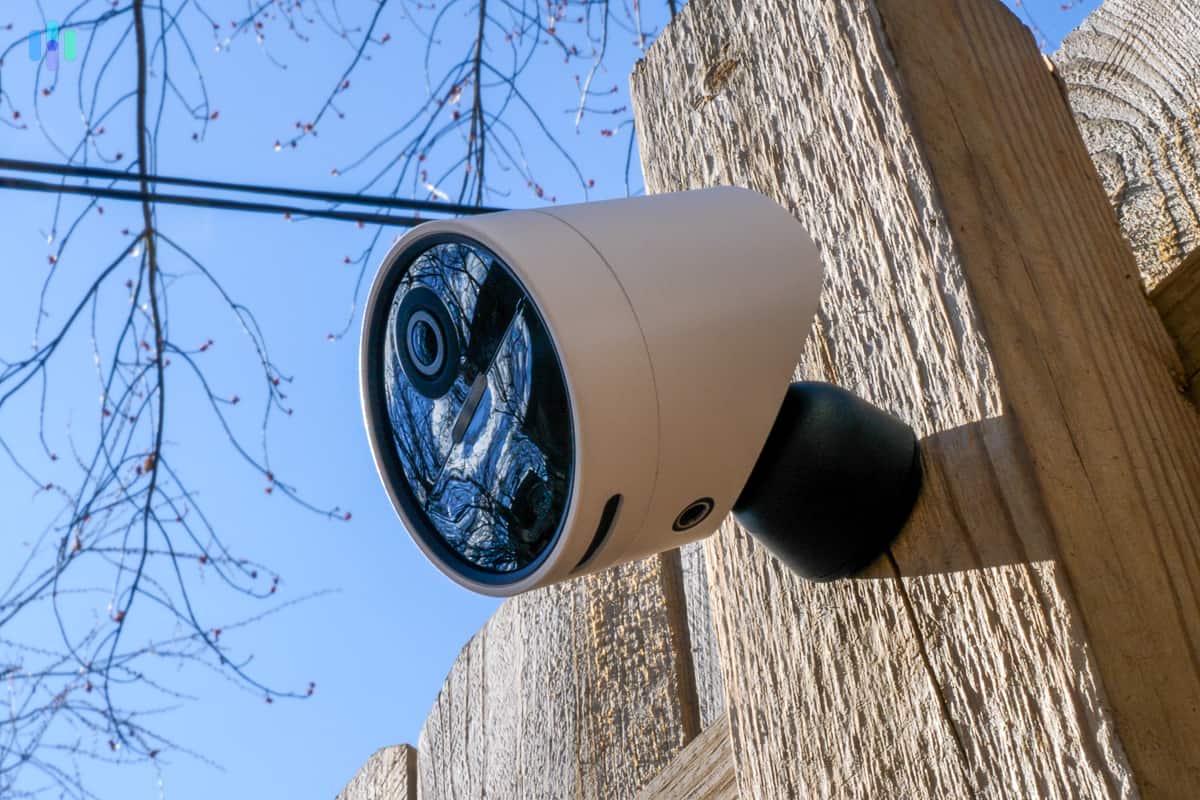
>> Learn More: How to Install Security Cameras Outside
Is Installing a Home Security System Difficult?
Home security systems aren’t all created equal, and some are more difficult to install than others. The security systems on this list are all mostly DIY-friendly, however, which means they’re designed for average people to set up without assistance.
I understand that “DIY” may freak some people out, but trust me — you’ve got this! I’ve installed and tested hundreds of pieces of security equipment, and the vast majority require very little prior know-how.
Generally speaking, my installation process goes like this:
- Download the app. Most modern DIY security providers have a smartphone app for Android and iPhone.
- Set up the hub. Your hub is the nerve center of the system. You’ll plug it in at a central location, connect it to your home’s Wi-Fi, and pair it with your phone.
- Install the components. Your system will likely have motion sensors, contact sensors, and security cameras. Each one will be installed and set up individually, usually using sticky command strips to affix them to walls and thresholds or small screws to attach them to the drywall.
- Set up your monitoring. You’ll likely need to pay a small subscription fee to get the most out of your system, so you’ll have to set up an account and provide your credit card information.
That’s it! Now you have a fully functional security system in your apartment or rental home. Start to finish, it shouldn’t take you more than an hour.
Can I Set Up Cameras Around My Rental?
This is a great question, but we first need to make a distinction between indoor and outdoor cameras.
Very few landlords or management companies would have an issue with you setting up an indoor camera inside your home, condo, or apartment. They’re used to keep an eye on your personal property and help experts monitor potential emergency situations if an alarm sounds. For the most part, you need to be concerned only with how the equipment is mounted. If you screw it into your drywall, you’ll probably have to patch it before you leave. Check out my guide to the best indoor security cameras for more information.
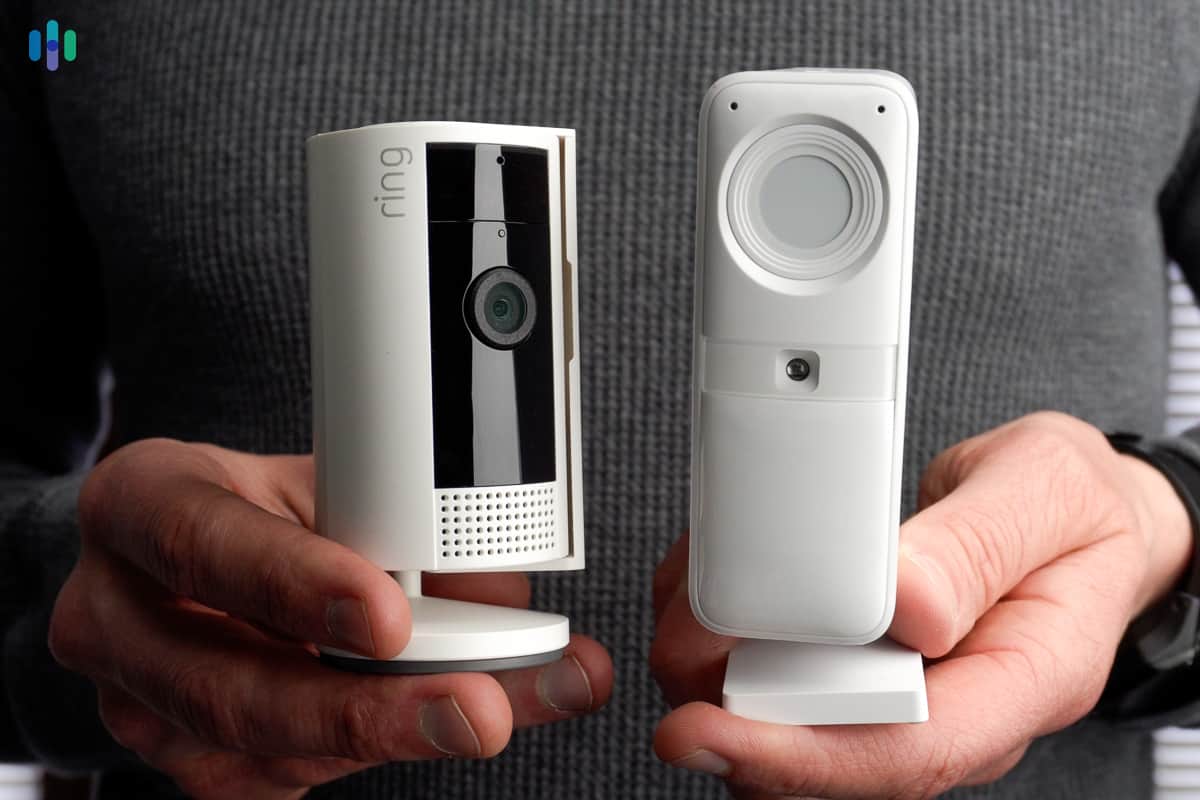
Outdoor security cameras are another story. Depending on what type of property you’re renting — such as a house or ADU — it may not be a big deal. Just check with your landlord to make sure they’re OK with it. If you live in a large apartment complex, though, you may run into privacy issues since the areas outside your unit are likely considered shared spaces. Check with your management company to see what is and isn’t acceptable. If they’re OK with it, head over to my roundup of the best cameras for apartments to see what will serve your needs.
How We Selected Security Systems for Renters
Whenever I test security systems, I make sure they meet my high standards in terms of equipment quality, features, installation, monitoring, and more. With security systems for renters, however, I added a few more requirements.
Installation
As a renter myself, one of my top priorities is to make sure I don’t lose my security deposit when I install a security system. So, I immediately ruled out security systems that require drilling or hardwiring. I want my security systems to be flexible when it comes to installation, so I selected only wireless security systems. As for the manner of installation, I don’t mind installing the system myself, but it sure is nice to have the option of professional installation.
Cost
The last thing renters want is another burdensome monthly fee. Monthly fees are normal with professionally monitored security systems, but I selected the systems with the most affordable fees. Ring Alarm was the most affordable I tested, at only $10 per month, and the most expensive was Frontpoint, at $49.99 per month. That’s a pretty low range, given that monthly fees can go as high as $60 with other companies.
I also factored in the cost of equipment. Many companies offer financing, but taking up those offers likely will cost you in the long run. All the systems on this list offer the option to pay for the equipment up front. That, by the way, is one reason monthly fees are low.
Contract
Monitoring contracts are normal in the home security business, but I understand why most renters think twice about committing to an alarm company long term. Things can change financially at any time, and, if that happens, long-term contracts will only make it harder to adapt.
With most of my top picks, you don’t need a long-term contract. Subscriptions auto-renew every month, but you can pause your monthly payments for any reason. You don’t need to explain to the company, and you don’t need to pay cancellation fees. The only company on this list that may require a contract is Frontpoint, but it has a month-to-month option if you purchase your system up front instead of financing it.
Features
Renters need just as much security as homeowners, if not more. Fortunately, studies have proven that alarm systems are effective at fighting crime. For alarm systems to work, however, you have to make sure they have all the necessary components, such as door sensors, window sensors, motion sensors, and, of course, security cameras.
Equipment is just one half of the equation though. You also need monitoring. If you decide to self-monitor, I recommend getting a system with smartphone access so you can review video footage remotely. Text and email alerts also come in handy, and features such as cellular backup, battery backup, and home automation can make all the difference.
Final Thoughts
While you might not feel as connected to your rental as you would if you owned the home that you live in, you still need to feel safe. And as someone that has lived in rentals for most of my adult life, I can say for certain that a security system always made me feel safer. It’s just a matter of choosing the right one for you.
After testing dozens of security systems, I figured out the top choice for renters is SimpliSafe. That didn’t come as a surprise though considering they initially started as a security system specifically for renters. But, there is some steep competition from Cove, Frontpoint, abode, and Ring Alarm. Each one offers its own unique advantage so I know you can find the perfect fit for your circumstances with one of those five providers.
Security System FAQs for Renters
-
Can I install a security camera at my apartment?
Most of the time an indoor security camera won’t be a problem, but you may run into some issues if you want to install one outdoors, depending on your living situation. Management companies typically won’t want you to install exterior cameras at all, and even if they let you, you won’t be able to point them at common areas. A better option for keeping an eye on things outdoors is a doorbell camera.
-
How much do security systems usually cost?
A home security system can cost anywhere from $50 to over $5,000, depending on the features you’re looking for and the size of the property you’re trying to protect. For a small home or medium-size apartment, you should expect to pay between $200 and $400 for the equipment and $10 to $50 per month for monitoring and subscription fees.
-
Can I professionally monitor a security system at my apartment?
Yes! Most modern DIY home security systems offer professional monitoring, but very few — if any — offer it for free. Make sure you budget between $10 and $50 per month if you want professional monitoring included.
-
Should I self-monitor my security system?
Many DIY home security providers offer the option to self-monitor their systems, but you’ll likely miss out on some functionality that will add layers of protection to your system, such as cloud storage, push notifications, and video downloads.
-
Will I get in trouble with my landlord if I install a security system?
Every landlord and lease agreement is different, but you likely won’t run into any issues as long as you’re not installing anything permanent and not doing anything that would encroach on your neighbors’ privacy. Make sure to check first though. You don’t want to lose your security deposit!
Federal Bureau of Investigation. (2019). Burglary.
ucr.fbi.gov/crime-in-the-u.s/2019/crime-in-the-u.s.-2019/topic-pages/burglary?clreqid=e383b769-c503-4831-a8aa-2259b90af67e&kbid=58587


